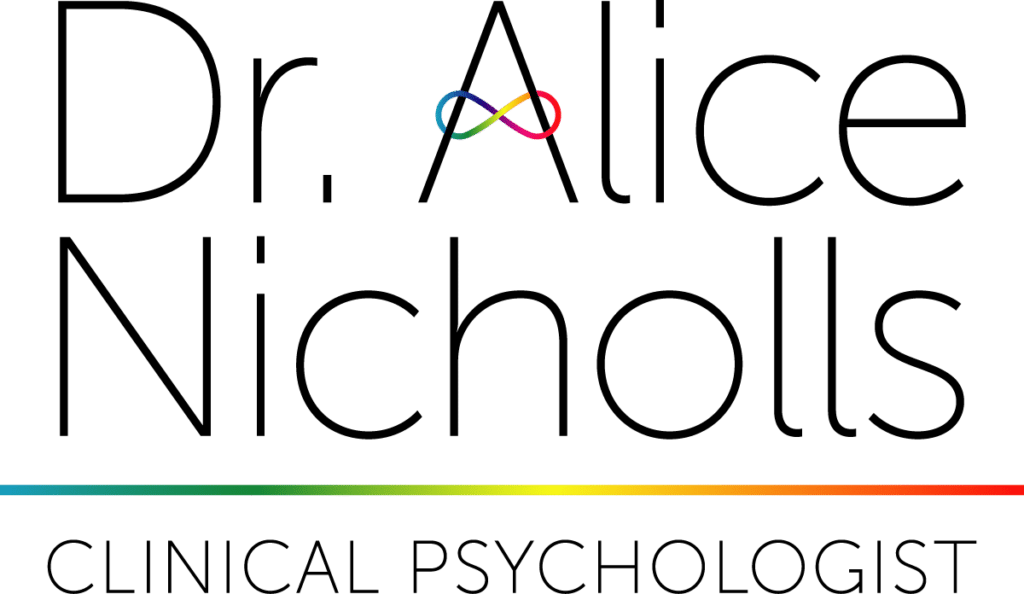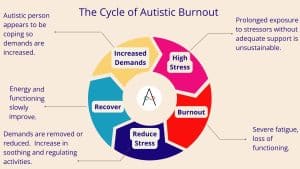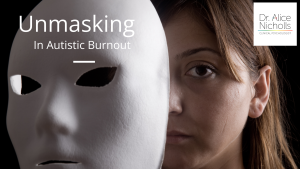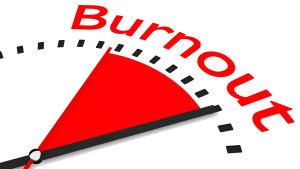Are you trying to recover from, or prevent, Autistic Burnout?
If you are, you may be noticing things that make your Autistic Burnout better and worse, identifying things that need to change to make life easier and more sustainable for yourself.
Maybe you realise that masking has played a large part in your burnout, or that you were trying to do too much, please too many people and ignore too many of your own needs.
Maybe you have noticed things that have contributed to your burnout and taken steps to change them. If so, that’s great.
However..
I’ve noticed that as Autistic People try to recover from Autistic Burnout, there are multiple barriers to reducing stress and increasing soothing and nourishing activities. Some of these barriers are external to us, for example:
- A demanding job
- High maintenance friendships
- Community roles
- Lack of childcare.
But some of those barriers are internal, for example:
- Self criticism
- High standards
- Shame
- Internalised ableism.
In this article I will focus on Self Criticism as a barrier to recovery in Autistic Burnout. I will cover the following:
- What self criticism is
- Why as an Autistic person you might be more vulnerable to self criticism
- What you can do about it
What is Self Criticism?
Self criticism is an internal voice, or sense that we are doing something wrong, that we are not trying hard enough, that we are not good enough, that we should do something.
We have often internalised the voice of a critical parent or teacher, someone who told us we should do something, regardless of how it feels.
You might notice your self-critic showing up (figuratively speaking) when you try to rest, or engage in an enjoyable activity. It might tell you that you are being lazy or useless. It might be more subtle telling you ‘you should clean the house instead’, or ‘push through’ and ‘try a bit harder’.
Can you think of any times today when the self-critic has shown up for you?
Maybe you told yourself you ‘should clean your teeth’ or ‘you have to go to a difficult meeting’. Maybe you told yourself ‘you should just get on with it’ or ‘suck it up’. You may have some highly critical thoughts such as ‘I’m useless’ or ‘I’m not good enough’.
If this is resonating with you then please know it is not your fault.
Please don’t criticise yourself for criticising yourself.
Autism and Increased Risk of Self Criticism
Self criticism is a very common, human experience. Growing up as a neurodivergent person you were probably exposed to more critical messages than neurotypical people.
You were probably told not to do things that made you feel happy and regulated, told that you looked weird, did the wrong thing, misread social cues, needed to be faster, less clumsy and generally more socially acceptable.
You will have also had more experience of feeling as if you were getting things wrong, not feeling accepted, being isolated and alone. Even if you were not overtly criticised, you will have felt criticised and rejected.
Humans are basically pack animals, so any signs, however subtle, that we don’t fit in, are hardwired to activate our threat (fight, flight, freeze, faun) systems. This is because, when our ancestors were moving around in hunter-gatherer groups, to be isolated from the group would have made us incredibly vulnerable.
Many of us mask out of fear of being rejected or excluded. This is a real fear, if we don’t present in a certain way in certain situations we may lose access to valuable resources such as jobs, benefits, health care and valued relationships. However, many of us mask constantly, even when there isn’t a massive threat to our wellbeing, because of a hangover from our caveman days when it was important to be accepted by the whole tribe. We may have also internalised the mask through years of conditioning.
Threat is also an incredible motivator and in the past, this has been exploited by parents, teachers and our peers. For example:
- If you don’t brush your teeth they will fall out
- If you don’t do the homework, you will get a detention
- If you don’t share, then you are selfish and no one will like you
- If you don’t make eye contact, people will think you are weird
- If you make noises like that you won’t make any friends
We may have learned to use threat to motivate ourselves, for example:
- If I don’t get 100% on the test I will be a failure
- If I don’t have a clean house then I’m disgusting
- If I don’t make good eyecontact I won’t get the job
- If I don’t make an extra effort to compensate for my weirdness then I won’t be liked
This means that, if we are high in self-criticism, we are maintaining a ‘threat’ state for a large proportion of our days. Our threat system activates cortisol production and decreases our ability to relax.
We hold ourselves up to neurotypical standards, find ourselves lacking, and so, rather than resting and replenishing ourselves, we continue to act out of fear; That we are not good enough, that ‘its not that hard’ that we ‘should just work harder’
Does any of this sound like you?
How much of your behaviour is motivated by threat? By fear of the consequences if you don’t do something? How often do you get the chance to relax, to engage in your special interests, only to find yourself feeling very anxious about doing so?
So what can you do about it?
- Examine the reality of the situation
Once you have noticed your self-critical thoughts and feelings, you can start to examine the reality of the situation. Look at what you really need to do and the actual consequences of doing, or not doing things.
For example, the reality of not brushing your teeth today, is not that they would fall out, not immediately, but you might not like the way your mouth feels, your breath smells and you might want to maintain good oral hygiene in the long term. In which case you might choose to brush your teeth out of kindness to yourself, even if you don’t like the sensation.
The reality of not baking a cake for the school fete might be that you don’t get any positive attention from the school. You might not be considered one of the pillars of the community but you get more time for yourself to rest and replenish yourself before your children get home and need more attention from you. Not making a cake, and having time to yourself might actually make you more able to parent in the way you want to.
- Try out being compassionate instead of critical
Imagine you were being compassionate towards yourself. By compassionate, I do not necessarily mean soft. I mean wise, strong and kind, taking into account the reality of the situation and your needs.
Ask yourself, ‘ if I was being compassionate towards myself, what would I do?’
The same behaviour can have a dramatically different internal experience. For example: I will brush my teeth because otherwise they will be nasty and fall out, is very different in quality to: I am choosing to brush my teeth because I deserve to have a healthy mouth.
Baking a cake for the school fete could be because you fear, if you do not, that your lack of provision, will make you look like a bad member of the community, or it could be because you enjoy baking and want to give something back to the community.
- Consider meeting your needs
When you look at your own needs, how many of them are you not meeting because, at least partially, of self criticism? Are you preventing yourself from stimming, engaging in special interests, or just taking time to relax? How often are you engaging in stressful activities instead, out of fear, rather than because it is what you need to do.
Start to consider where you are putting your energy, and whether, if you are being compassionate towards yourself, it is something you really need to do.
I hope you have found this article helpful. If you would like to learn more about self criticism and Autistic Burnout you might interested in joining the Autistic Burnout Recover Membership where this is the topic of the month.
This article draws heavily on concepts discussed in Compassion Focused therapy (e.g. Paul Gilbert). You can find out more about this type of therapy here.










